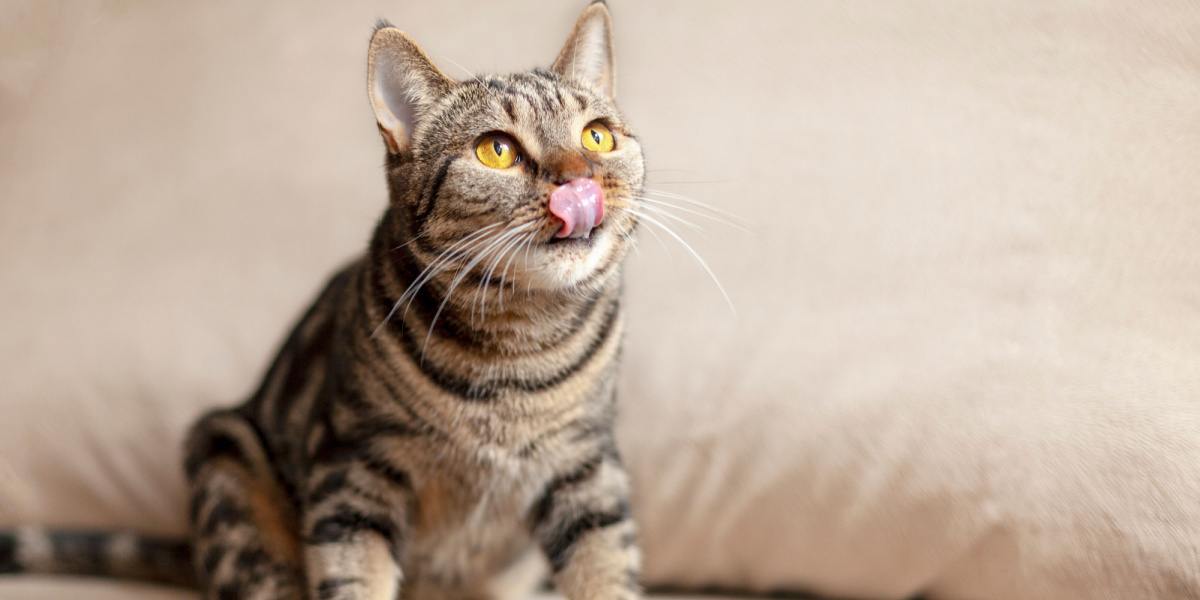
All cats stick their tongue out from time to time, which is completely normal. This action, also known as “blepping,” is super cute and might just be due to your cat forgetting to replace their tongue. For the most part if your cat sticking her tongue out and breathing heavily is often indicative of exhaustion, commonly resulting from vigorous play or strenuous activity. In some cases, though, it can signify your cat is tired or something more serious so here are 10 possible reasons below:
Cats might stick their tongue out for behavioral, physical, or health-related reasons. For most cats this is a routine behavior when they are sniffing scents, performing normal daily activities, or showing signs of relaxation or fatigue. Occasionally, a protruding tongue signifies a more serious health concern.Key Takeaways
1. Your Cat Is Feeling Stressed or Anxious
Cats show many behaviors associated with stress and anxiety. These can be subtle and sometimes hard to distinguish from behaviors related to contentment. Classic signs of fear in the cat include avoiding a trigger by turning away, avoiding eye contact, or chasing, swiping, or biting at a trigger.
Vocal expressions can be used, such as growling and hissing. Interestingly, some cats will continue to communicate calmly while they are stressed. They might even start purring. A cat might view a moment of stress as a good time to gather as much information as possible by sniffing, licking, and using the flehmen’s response.
Some cats will poke their tongue out or drool excessively, similar to when they are happy. In this case, you need to look to other cues in their body language to determine their feelings.
2. Your Cat Is Grooming or Eating
If you’ve ever felt your cat’s tongue, it is incredibly rough to touch. The surface is covered in barbs or papillae, small hook-like structures that enable the tongue to act as an effective hairbrush.
The tongue is fantastic for removing loose hair, but this can run the risk of creating furballs that many cats will swallow. If your cat has been grooming, fur on the tongue might lead to them sticking their tongue out.
Cats often use their tongues to prehend (or take hold of) their food, lifting it carefully with their tongue. Between eating, drinking, and grooming episodes, your cat might keep their tongue visible for a short time, which is nothing to worry about.
3. It’s a Sign Your Cat Is Totally Chilled Out
Some cats totally forget themselves when they are utterly relaxed. If your cat is snoozing on your lap, and enjoying being stroked and fussed, you might notice that their tongue is peeping out.
Your cat’s other facial expressions should be clear clues to how your cat is feeling and whether their protruding tongue is just a sign of complete bliss. When your cat is up and about, expect them to retract their tongue back into their mouth, well out of harm’s way.
4. Your Cat Is Scent Tasting
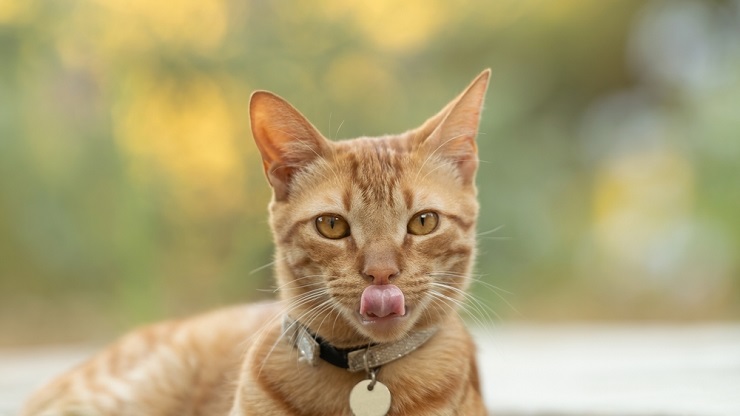
If a cat is sniffing intently with their mouth open and tongue slightly out, they are using their vomeronasal organ to detect pheromones.
Scent marking and detecting are crucial components of cat behavior. The flehmen response describes how your cat collects scents and pheromones from the environment on their tongue.
These scents are carried in the cat’s saliva to the vomeronasal organ, positioned between the roof of the cat’s mouth and the nostrils. A cat’s sense of smell is described as being around one thousand times more sensitive than a human’s.
The information they can gather from their environment can entirely shape their perception of their surroundings and, therefore, their behavior. Researchers describe how crucial the feline grimace and flehmen response is in information gathering and signaling for cats.
5. It‘S a Cat Breed Trait
Some cat breeds will extrude their tongues for long periods. This is more common in brachycephalic (short-nosed breeds) such as Persian and Himalayan cats. If this is something your cat has always done and is not a behavior change, then it is probably nothing to worry about.
Brachycephalic cats can also be prone to upper-respiratory infections, which might lead them to hold their tongue out more often. Still, you should notice other symptoms in these cases, such as nasal discharge or sneezing.
6. It’s a Desperate Attempt To Cool Down
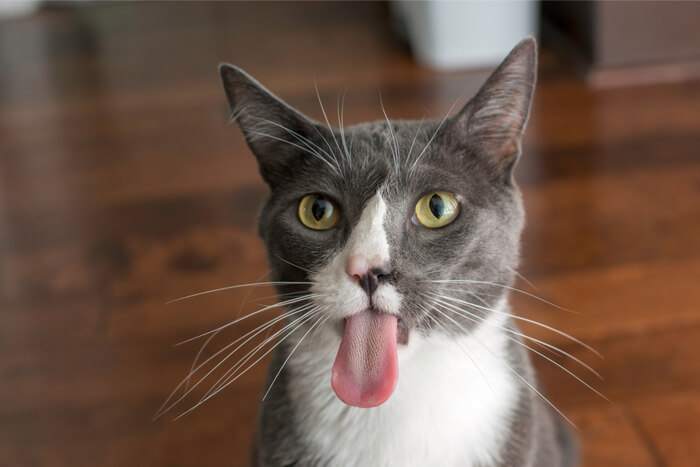
Unlike with dogs, panting is never normal in cats.
A human’s primary mechanism for cooling down when they overheat is to sweat. Dogs will pant to cool themselves, but cats have developed a novel system that recreates the human sweat model. On a hot day, they will groom and wash saliva onto their coat to evaporate and cool them.
If your cat is very hot, they might also sit with their mouth slightly open. In extreme circumstances, when a cat is at risk of heatstroke, they might open their mouth and pant. Cats will only pant when they are in severe distress.
In rare cases, this can be a behavioral trait due to extreme fear. However, it is recommended that any cat experiencing open-mouth breathing should see a vet immediately.
7. Your Cat Might Have Dental Problems
Dental disease is common in cats and might lead to your cat sticking their tongue out more than usual. This is particularly common in cats that have had teeth removed. Periodontal disease can lead to gum disease or gingivitis (inflammation of the gums).
Gingivitis is very painful and affects your cat’s eating ability. Some viral infections, such as calicivirus, can lead to severe gingivitis, known as feline stomatitis. Cats often require multiple teeth extractions to manage this condition. Viral diseases, kidney failure, and contact with caustic chemicals can cause severe mouth ulcers.
These are painful and might cause your cat’s tongue to poke out. In addition, oral tumors can affect how your cat moves and holds their tongue and their ability to close their mouth. If you see any signs of pain or bleeding from the mouth, this must be assessed by your veterinarian.
8. Your Cat Feels Nauseous
We don’t often associate cats with motion sickness. But cats can suffer from travel sickness, just like dogs and people. Symptoms include vocalization, a protruding tongue, excessive drooling, and vomiting.
If your cat is a frequent traveler, there is plenty that you can do to help combat their motion sickness. If you see signs of nausea in your cat and your pet is not traveling, this might be a sign of illness or perhaps a furball. However, if your cat is sick for an unknown reason, speak to your veterinarian for advice.
9. It’s a Sign of Facial Pain
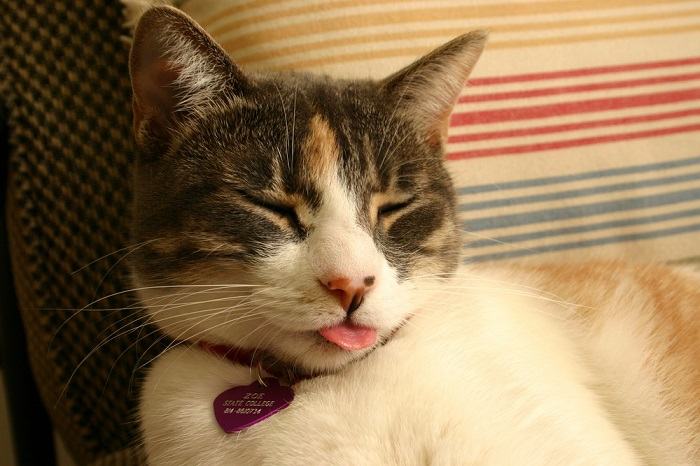
One sign of feline orofacial pain syndrome is holding out the tongue.
Cats can experience unexplained pain in their mouth and across their face. This is known as feline orofacial pain syndrome. Scientists believe this condition might be a genetic trait that is more common in Burmese cats.
Affected cats will show signs of intermittent pain on one side of their lips or mouth after eating, drinking, or grooming, which can lead to self-harm (e.g., chewing their own tongue).
It is believed that in some cases, the issue is triggered by dental disease or stress, and affects the trigeminal nerve endings, which causes them pain. Holding their tongue out might be an early signal that something is not right.
10. There Are Other Hidden Health Issues
Other health problems feline that may lead to your cat sticking out their tongue more than usual include:
- Cat flu
- Asthma
- Heart disease
- Jaw injury
- Other facial trauma
- Kidney disease
- Oral tumor or abscess
- Dementia
Assessing your cat for signs of breathing issues or injuries is particularly important. If your cat is opening his mouth to breathe, this is a critical emergency, and you must see a vet immediately. Also, any issues affecting your cat’s ability to eat and drink could rapidly make them unwell and dehydrated.
In that case, your cat should see your vet as soon as possible. Tongue protrusion as a sign of dementia tends to develop gradually over time, so signs might be subtle initially.
Final Thoughts
You will soon work out if a protruding tongue is normal for your cat. Check for signs of happiness or stress, consider their breed, and monitor for signs of pain. Ensure your cat has access to plenty of fresh water to keep that little pink tongue moist and comfortable. If your cat seems well, but you’re not sure if his behavior is normal, mention it at your cat’s next routine health check.
Also Read: How To Care For Feral Cats: 4 Tips For Happy, Healthy Ferals
Frequently Asked Questions
When should I worry about my cat sticking his tongue out?
In most cats, seeing a protruding tongue, particularly if there are no other symptoms, is not a concern and can be extremely endearing. If, however, it is a new trait, is happening continually or your cat has other signs of illness, it is essential that you see your veterinarian for a checkup.
If your cat is struggling to breathe, eat or drink, or has any other signs of trauma, then seeking veterinary advice is an absolute priority. After all, it is better to see your vet and get the all-clear than to miss something that could be life-changing.
My cat sticks his tongue out and drools—is this normal?
If your cat is sticking his tongue out and drooling, but it is not because they are totally relaxed, it could be due to the following reasons:
If your cat is unwell or has any symptoms of oral pain, including a decreased appetite, a full examination by your vet is in order. Many conditions can be successfully treated if they are caught early enough.
Conditions:
-
Bradshaw J. Normal feline behaviour: … and why problem behaviours develop. (2018). Journal of Feline Medicine and Surgery, 20 (5), 411-421. Retrieved November 16, 2022.
-
Rusbridge C, Heath S, Gunn-Moore DA, Knowler SP, Johnston N, McFadyen AK. (2010). Feline orofacial pain syndrome (FOPS): a retrospective study of 113 cases. Journal of Feline Medicine and Surgery. 12 (6), 498-508. Retrieved November 16, 2022.

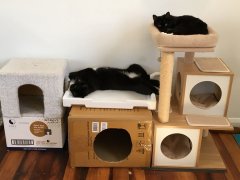



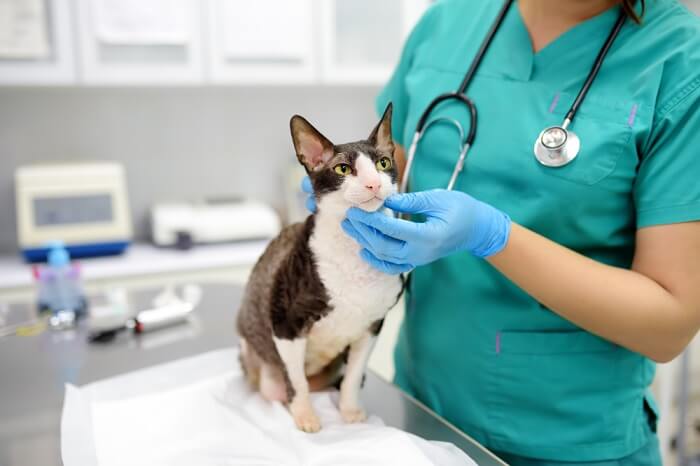

Hi, I would like to comment that there is one occasion when a mother cat pants, and that is during and after delivering her kittens. In this case it is normal, as long as it’s temporary.
Good point! Thanks for sharing.